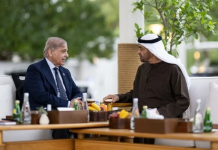ISLAMABAD: The Pakistan Hosiery Manufacturers Association (PHMA) leadership has vowed that value-added textile industry would work closely with the new government with a view to enhance the exports and revive the growth momentum.
The PHMA zonal chairman Farrukh Iqbal asked the government to back the value-added apparel sector for its potential to harvest benefits of GSP Plus, providing mass employment to the jobless population of the country, as the exports to the EU countries have now starting to drop which is a matter of serious concern.
However, Farrukh Iqbal hailed the government’s recent move to release Rs65 billion for payment of all verified pending refunds of exporters till previous month of 2024. This is a welcome move by Prime Minister Shehbaz Sharif, and we appreciate him along with his team, including Finance Minister Muhammad Aurangzeb and Commerce Minister Jam Kamal Khan, as this move will definitely boost the confidence of exporters and encourage the export sector. He also expressed the hope that the same spirit will be followed for payment of remaining refunds of sales tax deferred, DDT/DLTL, TUF and markup subsidy with a view to enhance exports.
As the energy prices have been escalated to a record high, the PHMA leader maintained that constant hikes in gas and power rates would further stoke inflation, amidst high markup, making the Pakistani value-added textile products uncompetitive in the international market.
He cautioned the government saying the move of increasing energy tariffs was unwise and would sabotage hard efforts of exporters to enhance Pakistan’s exports in previous years. He asked the new government to ensure a level-playing field by offering regionally competitive energy tariffs and continuing the Duty Drawback of Local Taxes and Levies scheme, as committed in the new five-year textile and apparel policy. He stressed that energy rates for industries should be brought at par or below the tariff prevailing in the competing regional countries.
He demanded a level-playing field with regional competitors through continuation of previous concessionary energy tariffs for the export industry.
Pointing out to the downward exports figure to the EU, he said that Pakistan’s exports to European countries dipped year-on-year by 7.54 per cent in the first seven months of the current fiscal year, mainly due to reduced demand for Pakistani goods in western, southern and northern Europe.
The export proceeds from these countries fell to $4.866 billion in July-January FY24, a drop from the $5.263bn recorded in the corresponding months of the previous year, according to figures compiled by the State Bank of Pakistan, he added.
PHMA (NZ) senior vice chairman Amanullah Khan and vice chairman Khawaja Musharaf Iqbal observed that this decline in export proceeds indicated the challenges faced by Pakistani exporters in these economically uncertain times despite having preferential access to 27-member EU countries.
According to the data, in FY23, exports to the EU dropped 4.41pc to $8.188bn from $8.566bn in the preceding fiscal year. However, the decline in exports was seen despite the Generalised System of Preferences Plus (GSP+) scheme.
The PHMA leadership said that GSP window had opened tremendous opportunities by way of inflow of abundant export orders which the industry would not be able to execute if liquidity problem of the industry is not resolved at the earliest. They stressed the need for adopting new technology so that Pakistan’s exports may be able to cope with the emerging challenges in international arena.

















